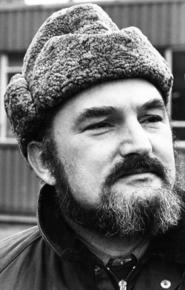Jonathan rang Alan from Jamaica maybe a year or so ago, because a journalist had referred to Alan, in print, as the 'late' theatre critic of the Telegraph.
From The Times June 6, 2008
Jonathan Routh: Candid Camera prankster
Prankster who was one of the leading spirits behind the immensely successful television hoax programme Candid Camera
Jonathan Routh
Jonathan Routh was a supreme practical joker and hoaxer whose star reached its zenith with Candid Camera, the hugely successful Sixties television series in which unsuspecting members of the public were duped into making fools of themselves while filmed with a hidden camera, to the delight of viewers. It was one of the earliest examples of television voyeurism.
Routh was also a primitive artist and an author who led a charmed, eccentric, bohemian life in which, by his own admission, he relied heavily on the kindness of wealthy friends, living in a succession of smart addresses and eating at the best restaurants. “I have never had any money. Never,” he once confessed.
Candid Camera — a concept imported from America and the forerunner of Game for a Laugh and Beadle’s About — was presented by Bob Monkhouse, with the lugubrious, beetle-browed Routh and Arthur Atkins as the pranksters who would spook hapless participants with talking pillar boxes and cars without engines. Jennifer Paterson, who later found success in the cookery show Two Fat Ladies, would sometimes nudge victims into shot while disguised as a cleaner.
A tailor was persuaded to make a suit for a chimpanzee. Tourists were coerced into propping up a “leaning” Nelson’s Column. Once Routh dressed up as a tree, stood at a bus stop and asked: “Does this bus go to Sherwood Forest?” On another occasion, he stuck his head out of a coal hole and told passers-by that he was looking for Baker Street Underground station. It was innocent stuff by today’s standards, but considered frightfully daring at the time.
Related Internet Links
Watch Jonathan Routh on Candid Camera
Among his most celebrated hoaxes was posing as a driving instructor and demonstrating to a nervous woman pupil the proper way to drive. He crashed four times in five minutes. On another occasion he dumbfounded an airline receptionist by removing the wheels of her car, painting the windows and taking out the seats when she called at a garage for two gallons of petrol.
Routh once organised a “silent recital” by “an unknown Hungarian pianist” at the Wigmore Hall. “Tomas Blod” performed “Transmogrifications, Opus 37, by Sandal” in which he sat at the piano and played not a note. Routh thought it “a quiet success”.
On another occasion he posted himself from Sheepwash, Devon, to the offices of the Daily Mail in Fleet Street, claiming that he was too scared to go to London on his own. As “livestock”, parcels had to be accompanied at all times, he was put in a postman’s care for the duration of the journey and delivered for £2. The postman was silent throughout. Routh thought this episode demonstrated the height of English tolerance and good manners.
John Reginald Surdeval Routh was born in 1927 and spent part of his childhood in Palestine where his father was a colonial governor. He was educated at Uppingham School, from which he was expelled for putting up a banner in the chapel which read: “Vote Routh, Communist”, while campaigning in a mock election. He read history at Emmanuel College, Cambridge, revived the moribund Footlights Dramatic Society and edited Granta, one edition of which was described by a chaplain as “the most obscene item I have ever seen in print”. As an indication of things to come, Routh took a group of undergraduates off to “measure” Bletchley for a bypass, and then collected signatures condemning the fake proposal. After 18 months or so he was invited to leave Cambridge.
Finding himself at a loose end, Routh, who by this time had changed his first name to Jonathan, invented Jeremy Feeble, an 18th-century poet whom he contrived to get mentioned in the Times Literary Supplement and on the BBC Third Programme.
His first job was as showbusiness editor of the now-defunct Everybody’s Magazine, which published a piece he filed from India in 1951 while on location with Jean Renoir, who was filming The River. He wrote that shooting had to be suspended when the cast was struck down by “dhoti rash, a virulent infection contracted from low-caste washerwomen”.
This job was followed by a spell as “Candid Mike” on Radio Luxembourg. In one broadcast he conducted a bizarre conversation with a London Transport inspector who had caught him travelling with a grand piano on the Underground.
Candid Camera was launched on an unsuspecting public in 1960 and became an instant success with viewers, who relished the misfortunes of Routh’s hapless victims. In the first programme he pushed an engineless car into a garage and told the mechanic that it had just broken down. The garage man opened the bonnet to find nothing there. Routh played dumb. Utterly bewildered, the mechanic then looked under the car and in the boot before summoning his mates to see if he’d missed something. Eventually, one of them pronounced to general astonishment that, indeed, there was no engine.
Subscribe to:
Post Comments (Atom)

No comments:
Post a Comment